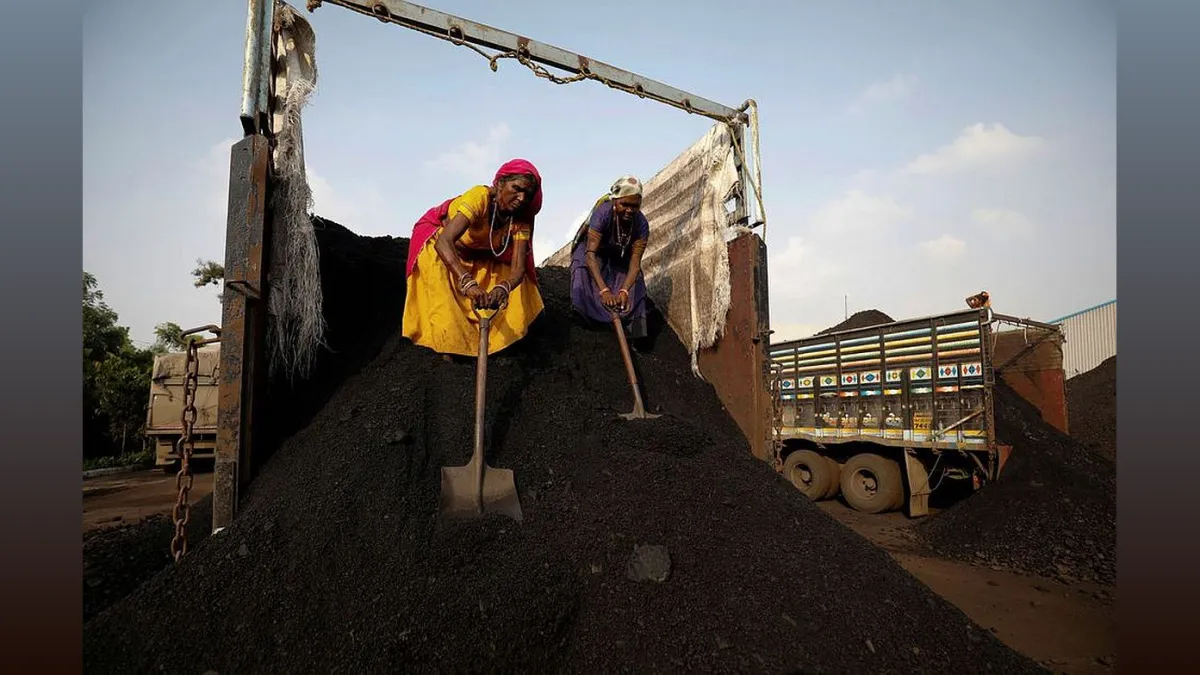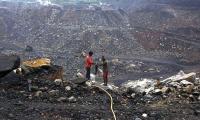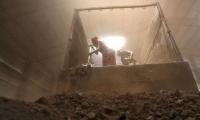Jharia Master Plan: Cabinet to Approve Revised Plan
The Union Cabinet is likely to approve a revised Jharia Master Plan (JMP) for fire, subsidence, and rehabilitation in Jharkhand's Dhanbad district. The plan aims to address the ongoing coal mine fires and relocate affected families.

Photograph: Amit Dave/Reuters
New Delhi, Nov 10 (PTI) The Union Cabinet is likely to soon approve a proposal on revised Jharia Master Plan (JMP), sources said.
The Jharia Master Plan for dealing with fire, subsidence and rehabilitation in Jharkhand's Dhanbad district was approved by the Centre in August 2009 with an implementation period of 10 years and a pre-implementation period of two years with an estimated investment of Rs 7,112.11 crore. The plan expired in 2021.
According to sources, the proposal on revised JMP with revised duration in phases is likely to be passed by the Cabinet soon.
In the first phase of rehabilitation, priority would be given to those locations where there is an immediate threat to human life, and thereafter, low-risk and less hazardous locations would be rehabilitated, they said.
Under the revised JMP, Coal India (CIL) will provide assistance of Rs 500 crore per year, they said, adding that both CIL and its arm Bharat Coking Coal Ltd (BCCL) will tackle the current fire and any future fire outbreaks.
Coal minister G Kishan Reddy had on Monday told reporters on the sidelines of a function that "Jharia Master Plan...has been pending for the last two years. On this topic the Prime Minister has asked to make a comprehensive action plan. I have myself gone to Jharia mining area and have met people and public representatives there. We are preparing an action plan on it and soon its Cabinet note will be finalised."
After the approval of the Cabinet, the work on the implementation of JMP will begin.
BCCL chairman and managing director Samiran Dutta had earlier said that the first phase of the plan has been completed, successfully relocating around 2,800 families and reducing the fire area to 1.8 sq km in 2021-22 from the original 17.32 sq km.
Dutta had said that 33,000 homes have already been built, with BCCL constructing 18,000 and the rest by the nodal agency Jharia Resettlement Development Authority (JRDA).
He had said that the plan includes building more essential social infrastructure like schools, colleges, and other smart city facilities.
Coal mines in Jharia Coalfield date back to 1916 when the first incident of fire was reported. Since then, a number of fires have occurred within the overburden debris.
Prior to nationalisation, these mines were privately owned and operated with a profit-driven approach and mining methods were unscientific with least concern for safety, conservation and the environment. This practice has resulted in severe land degradation, subsidence, coal mine fires and other socio-environmental problems.
After nationalisation, Polish team and Indian experts were appointed in 1978 for studying the Jharia coal fire predicament.
According to the investigation, 77 fires across 41 collieries of BCCL were identified. In 1996, the Centre set up a high-power committee under the chairmanship of coal secretary to review the problems of fire and subsidence in Jharia coalfields.
The Jharia Master Plan for dealing with fire, subsidence and rehabilitation in Jharkhand's Dhanbad district was approved by the Centre in August 2009 with an implementation period of 10 years and a pre-implementation period of two years with an estimated investment of Rs 7,112.11 crore. The plan expired in 2021.
According to sources, the proposal on revised JMP with revised duration in phases is likely to be passed by the Cabinet soon.
In the first phase of rehabilitation, priority would be given to those locations where there is an immediate threat to human life, and thereafter, low-risk and less hazardous locations would be rehabilitated, they said.
Under the revised JMP, Coal India (CIL) will provide assistance of Rs 500 crore per year, they said, adding that both CIL and its arm Bharat Coking Coal Ltd (BCCL) will tackle the current fire and any future fire outbreaks.
Coal minister G Kishan Reddy had on Monday told reporters on the sidelines of a function that "Jharia Master Plan...has been pending for the last two years. On this topic the Prime Minister has asked to make a comprehensive action plan. I have myself gone to Jharia mining area and have met people and public representatives there. We are preparing an action plan on it and soon its Cabinet note will be finalised."
After the approval of the Cabinet, the work on the implementation of JMP will begin.
BCCL chairman and managing director Samiran Dutta had earlier said that the first phase of the plan has been completed, successfully relocating around 2,800 families and reducing the fire area to 1.8 sq km in 2021-22 from the original 17.32 sq km.
Dutta had said that 33,000 homes have already been built, with BCCL constructing 18,000 and the rest by the nodal agency Jharia Resettlement Development Authority (JRDA).
He had said that the plan includes building more essential social infrastructure like schools, colleges, and other smart city facilities.
Coal mines in Jharia Coalfield date back to 1916 when the first incident of fire was reported. Since then, a number of fires have occurred within the overburden debris.
Prior to nationalisation, these mines were privately owned and operated with a profit-driven approach and mining methods were unscientific with least concern for safety, conservation and the environment. This practice has resulted in severe land degradation, subsidence, coal mine fires and other socio-environmental problems.
After nationalisation, Polish team and Indian experts were appointed in 1978 for studying the Jharia coal fire predicament.
According to the investigation, 77 fires across 41 collieries of BCCL were identified. In 1996, the Centre set up a high-power committee under the chairmanship of coal secretary to review the problems of fire and subsidence in Jharia coalfields.
You May Like To Read
TODAY'S MOST TRADED COMPANIES
- Company Name
- Price
- Volume
- Vodafone-Idea-L
- 11.65 (+ 3.56)
- 106772451
- Alstone-Textiles
- 0.28 ( -3.45)
- 44187760
- Mangalam-Industrial
- 0.88 ( -2.22)
- 39177573
- Sunshine-Capital
- 0.27 (+ 3.85)
- 35956340
- GMR-Airports
- 104.40 (+ 6.37)
- 30453005




